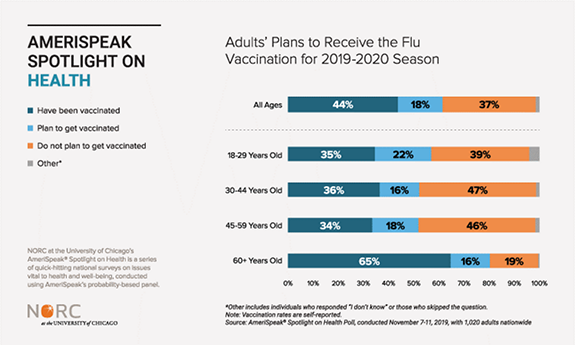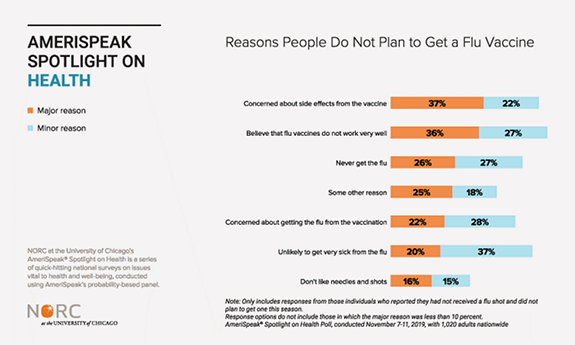37% of Americans Do Not Plan to Get a Flu Shot This Season
Top reasons for not getting vaccinated include being worried about side effects, and thinking the flu shot is not effective.
CHICAGO, Dec. 3, 2019 — December 2 marked the beginning of the Centers for Disease Control and Prevention’s (CDC) National Influenza Vaccination Week, yet more than half of Americans remain unvaccinated as flu season gets underway. According to a new AmeriSpeak® Spotlight on Health survey from NORC at the University of Chicago, 37 percent of adults do not intend to get a flu shot this season. As of early November, 44 percent of adults reported that they received a flu vaccination. Another 18 percent had not yet been vaccinated but intended to get a vaccination this season.
“The CDC reports this year’s flu season is off to an early start in most states and has already claimed numerous lives,” said Caroline Pearson, senior vice president at NORC at the University of Chicago. “This year’s vaccine appears well matched against the current strains, and widespread vaccination remains our best defense against this sometimes deadly virus.”


People over age 60, who are at higher risk for flu-related complications, report the highest vaccination rate (65 percent). However, 1 in 5 people (19 percent) age 60 and older still do not plan to get vaccinated this season. Adults between the ages of 45 and 59 are the least likely to report being vaccinated, with only 34 percent of this group having been vaccinated as of early November. Among adults who have children under age 18 living in their home, 43 percent said they do not plan to vaccinate their children.
Routine annual influenza vaccination for all persons age 6 months or older who do not have contraindications has been recommended by the CDC and CDC’s Advisory Committee on Immunization Practices since 2010.


When asked why they do not intend to be vaccinated, adults were most likely to cite concerns about side effects from the vaccine (37 percent). Thirty-six percent do not think the vaccine works very well.
“Widespread misconceptions exist regarding the safety and efficacy of flu shots. Because of the way the flu spreads in a community, failing to get a vaccination not only puts you at risk but also others for whom the consequences of the flu can be severe. Policymakers should focus on changing erroneous beliefs about immunizing against the flu,” said Caitlin Oppenheimer, senior vice president of Public Health Research at NORC at the University of Chicago.
Methodology
The self-funded poll was conducted between November 7 and 11, 2019, during a monthly Omnibus survey. It included 1,020 interviews with a nationally representative sample (margin of error +/- 4.06 percent) of adult Americans age 18+ using the AmeriSpeak® Panel. AmeriSpeak is NORC’s probability-based panel designed to be representative of the U.S. household population. A comprehensive listing of all study questions, tabulations of top-level results for each question.
More NORC Research on Vaccines
NORC has conducted the National Immunization Survey (NIS) for the CDC since 2005, providing annual estimates of vaccination coverage estimates for infants age 19-35 months and adolescents age 13-17 years. Vaccines monitored are those recommended by the Advisory Committee on Immunization Practices. Estimates are produced for each state and selected sub-state geographic areas. NORC also conducts the NIS-Flu for CDC, providing weekly estimates of influenza vaccination rates for children age 6 months to 17 years of age during each flu season since 2010-2011. NORC has conducted, published, and presented a variety of research related to methods for deriving the most accurate estimates of vaccination rates possible.
About the AmeriSpeak Spotlight on Health
NORC at the University of Chicago’s AmeriSpeak® Spotlight on Health is a series of quick-hitting national surveys on issues vital to health and well-being, conducted using AmeriSpeak’s probability-based panel.
About NORC at the University of Chicago
NORC at the University of Chicago conducts research and analysis that decision-makers trust. As a nonpartisan research organization and a pioneer in measuring and understanding the world, we have studied almost every aspect of the human experience and every major news event for more than eight decades. Today, we partner with government, corporate, and nonprofit clients around the world to provide the objectivity and expertise necessary to inform the critical decisions facing society.
Contact: For more information, please contact Eric Young at NORC at young-eric@norc.org or (703) 217-6814 (cell).





